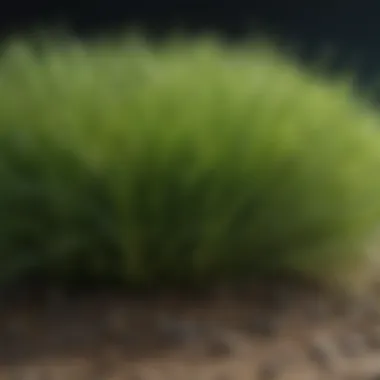Bermuda Grass Seed in Bulk: A Complete Guide


Intro
Bermuda grass is a popular choice for lawns, golf courses, and sports fields due to its rapid growth, durability, and vibrant color. The increasing demand for high-quality Bermuda grass has led to a significant market for bulk seed purchasing. Understanding the nuances of Bermuda grass seed is crucial for agricultural professionals and enthusiasts alike. This comprehensive guide aims to shed light on various aspects of Bermuda grass seed for sale in bulk, covering its benefits, selection criteria, cultivation practices, and emerging market trends.
Prologue to Bermuda Grass
Bermuda grass has gained prominence in various landscaping and agricultural applications. Understanding its characteristics and uses is essential for those looking to purchase Bermuda grass seed in bulk. The significance of this grass lies not only in its aesthetic appeal but also in its resilience and functionality. With a deep root system, Bermuda grass can thrive in diverse climates, making it a favored choice for many agricultural professionals and enthusiasts.
Characteristics of Bermuda Grass
Bermuda grass is characterized by its fine texture and vibrant green color. It grows densely, creating a lush and inviting appearance. This grass species is warm-season and grows best in sunny environments, needing around six hours of direct sunlight daily. It also adapts well to different soil types, though it performs optimally in well-drained sandy soils. Notably, Bermuda grass is known for its durability; it can withstand heavy foot traffic, making it ideal for sports fields and high-traffic areas. Its growth habit is aggressive, allowing it to spread quickly, which can be both a positive and a negative in certain contexts.
Common Uses of Bermuda Grass
Bermuda grass finds a wide array of applications. First, it is popular for lawns due to its lush appearance and ability to endure wear and tear. Many homeowners choose it for its aesthetic benefits, transforming ordinary yards into vibrant green spaces.
- Sports Fields: The resilience of Bermuda grass makes it suitable for athletic fields, golf courses, and parks. Its ability to recover from damage quickly is a major advantage.
- Erosion Control: Its extensive root system helps prevent soil erosion, contributing to environmental sustainability.
- Landscaping: Beyond residential lawns, Bermuda grass is often used in commercial landscaping projects, adding a touch of greenery to public spaces.
The Importance of Bulk Seed Purchasing
Purchasing Bermuda grass seed in bulk holds significant value, particularly for those engaged in large-scale agricultural operations, golf course management, or landscaping. The decision to buy in larger quantities can affect both financial and operational aspects. Understanding the importance of bulk seed purchasing is essential for maximizing benefits and making informed choices.
Economic Advantages of Buying in Bulk
One of the most compelling reasons to consider bulk purchasing is the potential for substantial cost savings. When buying Bermuda grass seed in larger quantities, the price per unit typically decreases. This reduction occurs due to economies of scale, allowing suppliers to offer better rates to buyers. Furthermore, brands like Pennington and Scott's often provide discounts when customers commit to higher purchases.
- Cost Efficiency: In addition to direct savings, bulk purchasing reduces shipping costs over multiple transactions.
- Price Stability: Bulk purchasing can also mitigate the risk of price fluctuations in the market, providing more consistent budgeting and financial planning.
- Availability Assurance: Buyers can ensure they have a steady supply of seed, which is crucial for operations dependent on precise timing for planting and maintenance.
"By investing in bulk Bermuda grass seed, you safeguard against unforeseen market changes and availability issues."
Logistical Considerations
While the economic benefits are clear, logistical considerations are equally crucial in the bulk purchasing decision. Understanding the implications of buying in large quantities can ensure a seamless gardening or farming operation.
- Storage Requirements: Bulk seed purchasing necessitates adequate storage facilities. Properly storing seeds can maximize their longevity and viability. Humidity and temperature control are vital to prevent deterioration.
- Transportation Solutions: Consider the means of transport when arranging bulk orders. It’s essential to have a reliable logistics partner who specializes in agricultural products.
- Usage Planning: Buyers should plan their seeding operations to align with the quantity purchased. This planning helps in effectively utilizing the bulk seed before it loses its germination potential.
In summary, recognizing the importance of bulk seed purchasing is key for anyone involved in agricultural activities. The financial benefits, combined with careful logistical planning, can lead to a successful and thriving operation. Understanding these elements can empower agronomists and other professionals to make more calculated and effective purchasing decisions.
Factors to Consider When Buying Bermuda Grass Seed
When considering the purchase of Bermuda grass seed, several key factors should be evaluated to ensure a successful cultivation experience. The decision impacts not only the quality of the grass but also the long-term results for any agricultural project. Understanding these elements can assist farmers and enthusiasts in making informed decisions that align with their specific needs.
Seed Quality and Purity
Quality and purity of the seed are critical aspects to assess before purchasing Bermuda grass seed. High-quality seeds have higher germination rates, which means more efficient growth and a robust lawn or field. It is crucial to check for seed certification, which indicates that the seeds meet specific standards. Purity ensures that the seed mix contains the desired amount of Bermuda grass without contamination from weed or other grass species. Investing in properly sourced and certified seeds ultimately leads to fewer pest and weed issues, meaning less effort in management later on.
Varietal Options Available
Understanding the variations within Bermuda grass can significantly affect the outcomes in different climates and soil types. Different types of seeds can be more suited for certain applications, whether for residential lawns, sports fields, or pastures.
Common Varieties


Common varieties of Bermuda grass include Coastal and Alicia. Coastal Bermuda is often preferred in warm climates due to its drought resistance and ability to establish quickly. This variety is also known for its dense growth, making it well-suited for high-traffic areas. Alicia Bermuda typically offers a fine texture that enhances its aesthetic appeal. The main feature that makes these varieties popular is their adaptability.
However, certain differences exist. Coastal Bermuda may struggle in cooler temperatures, while Alicia is more tolerant but may need more maintenance regarding pest and disease management.
Hybrid Versus Non-Hybrid
When comparing hybrid versus non-hybrid Bermuda grass seeds, important distinctions emerge. Hybrid varieties, such as Tifway 419, often display superior traits over non-hybrid types, including better drought resistance and a more resilient growth pattern. For extensive agricultural use, hybrids can prove to be more efficient, providing enhancements that are beneficial for commercial applications.
On the other hand, non-hybrid seeds maintain the genetic diversity that can be beneficial in varying environmental conditions. While hybrids may offer consistent performance, they might lack adaptability in certain soil types or microclimates. Understanding these advantages and disadvantages can guide buyers in selecting the right type that meets the specific demands of their projects.
"Selecting the appropriate Bermuda grass seed involves understanding both the specific species and the environment in which it will grow."
Where to Source Bermuda Grass Seed in Bulk
Sourcing Bermuda grass seed in bulk is pivotal for those looking to establish a lawn, sports fields, or agricultural settings with this resilient turf grass. The right source ensures quality and consistency, which are essential for thriving growth. Understanding where to obtain bulk Bermuda grass seed can lead to significant cost savings and higher quality lawns. Two primary avenues for sourcing these seeds include online suppliers and local agricultural cooperatives.
Online Retailers and Suppliers
Purchasing from online retailers has gained substantial popularity among gardeners and agricultural professionals. The advantages are clear:
- Wide Selection: Online retailers often provide a vast array of varietals, making it easier to select the specific type needed for your climate or intended use.
- Convenience: Orders can be placed from home, eliminating the need to drive to a physical store.
- Detailed Information: Reputable sites frequently include detailed descriptions, customer reviews, and usage guides, which provide insights into the quality and suitability of the seed.
Some popular online marketplaces that offer Bermuda grass seed in bulk include Amazon and Seedland. These sites allow for direct comparisons and provide various purchasing options suitable for different projects.
Local Agricultural Cooperatives
Local agricultural cooperatives offer another viable option for sourcing Bermuda grass seed. These cooperatives typically cater to regional farmers and enthusiasts, creating a community-focused environment:
- Expertise: Suppliers often have extensive knowledge about the local climate and soil conditions. They can advise on the best seeds tailored to specific regions, optimizing growth potential.
- Support: Many cooperatives provide additional resources, such as workshops or seminars, on best practices for seed cultivation and maintenance.
- Cost-Effectiveness: By buying directly from these cooperatives, prices are often competitive, and members may benefit from further discounts.
In summary, both online retailers and local cooperatives serve as effective sources of bulk Bermuda grass seed. Each venue has its unique strengths that can cater to different needs and preferences. Researching and connecting with these suppliers can yield significant benefits for those committed to high-quality turf establishment.
"Quality seeds are the foundation of a successful lawn. Understanding where to source them is equally vital."
By using these sources wisely, you can ensure a successful cultivation of Bermuda grass that meets your specific requirements.
Effective Cultivation Practices for Bermuda Grass
Cultivating Bermuda grass effectively is essential for achieving a lush, resilient lawn or sports field. Knowing the correct practices will ensure that the grass thrives, providing benefits such as drought resistance and durability. Here, we delve into key practices for cultivating Bermuda grass, focusing on soil preparation, seeding techniques, and irrigation practices.
Preparing the Soil
Soil preparation creates the foundation for successful Bermuda grass cultivation. Before planting, it is crucial to assess the soil quality. Begin by conducting a soil test to determine pH levels and nutrient content. Bermuda grass thrives in well-drained, sandy loam soils with a pH of 6 to 7. Here are steps to prepare the soil:
- Clear the Area: Remove any debris or old grass to prevent competition for nutrients.
- Tilling: Break up compacted soil using tillers. This improves aeration and allows for better root development.
- Amendments: Based on the soil test, add organic matter like compost or manure to boost nutrient levels. Additionally, lime can be used to raise pH, while sulfur can lower it.
- Leveling: After tilling, level the area to promote even water distribution.
These steps ensure optimal conditions for growth and enhance root establishment.
Seeding Techniques
The seeding technique significantly influences Bermuda grass establishment. There are different methods that one can employ. Each method has its advantages and suitability based on the area:


- Broadcast Seeding: This method involves scattering seeds evenly across the soil. It is simple and effective for large areas. Ensure the seeds are lightly covered with soil by raking.
- Hydroseeding: This technique involves mixing seeds with water and a mulch slurry, then spraying it onto the soil. It is beneficial for difficult terrains and promotes quick germination.
- Sod Laying: For immediate results, sod can be used. This involves laying pre-grown grass rolls on prepared soil. Ensure the seams are tightly fit to avoid gaps.
Each method should be considered according to desired outcomes and soil conditions. After seeding, it is important to keep the area moist until the grass establishes.
Irrigation Practices
Irrigation is a critical factor in establishing Bermuda grass, especially in the initial growing phase. Proper watering promotes seed germination and root development. Here are best practices for irrigation:
- Frequency: Watering should be done frequently during the germination period, generally every day for the first two weeks. Afterward, you can reduce frequency.
- Depth: Ensure water penetrates at least 6 to 8 inches into the soil. Deep watering encourages deeper root growth.
- Time: Early morning is the ideal time to water. This reduces evaporation loss and disease risks.
- Adjusting: Monitor weather conditions and adjust watering as necessary. Notably, during rainy periods, supplemental watering may not be required.
By carefully applying these irrigation practices, you significantly enhance the chances of a healthy Bermuda grass establishment.
"Effective cultivation practices are the backbone of successful Bermuda grass growth, providing both the aesthetic appeal and functional benefits of this grass species."
Maintaining Bermuda Grass
Maintaining Bermuda grass is crucial for ensuring a lush and healthy lawn or playing field. A well-maintained Bermuda grass area presents numerous benefits, including enhanced aesthetic appeal, improved durability, and optimal performance in recreational activities. To achieve this, specific practices must be implemented throughout the growing season. These practices include proper fertilization, pest and weed management, and aeration techniques, allowing the grass to thrive and withstand various environmental conditions.
Fertilization Strategies
Fertilization is a fundamental aspect of maintaining Bermuda grass. The grass requires adequate nutrients to support growth, vigor, and resilience against diseases. A balanced fertilization strategy involves the following key elements:
- Nutrient Ratio: Opt for a fertilizer that offers a good balance of nitrogen, phosphorus, and potassium. A common recommendation for Bermuda grass is a ratio of 3:1:2.
- Timing: Apply fertilizer during the growing season, typically from late spring to early summer. This timing aligns with Bermuda grass’s peak growth period, aiding in robust development.
- Soil Testing: Conduct regular soil tests to monitor nutrient levels and adjust fertilization accordingly. This practice ensures that the application is tailored to specific soil needs.
- Slow-Release Options: Consider slow-release fertilizers to provide a steady supply of nutrients over time. This can help reduce the frequency of applications and minimize nutrient runoff.
Implementing these strategies effectively can lead to a healthy Bermuda grass lawn, characterized by a vibrant green color and a dense growth pattern.
Pest and Weed Management
Pest and weed management is vital to maintaining Bermuda grass. Pests can cause significant damage, while weeds compete for nutrients, water, and light. To address these issues:
- Regular Monitoring: Frequently inspect the grass for signs of pest infestation or weed growth. Early detection facilitates prompt action.
- Integrated Pest Management: Use an integrated approach that combines biological, cultural, and chemical practices. This may include introducing beneficial insects or applying organic pesticides as needed.
- Weed Control Methods: Utilize pre-emergent herbicides in early spring to prevent weed seeds from germinating. Post-emergent herbicides can be applied to manage existing weeds.
- Cultural Practices: Maintain proper mowing heights, watering, and fertilization to create an environment less conducive to pests and weeds.
By adopting these management strategies, you can protect Bermuda grass from harmful organisms while promoting a healthy growing environment.
Incorporating Aeration Techniques
Aeration plays a vital role in the overall health of Bermuda grass. It involves perforating the soil with holes to allow air, water, and nutrients to penetrate the root zone. Here are some effective aeration techniques to consider:
- Core Aeration: This method involves removing small plugs of soil from the lawn. It enhances soil aeration, reduces compaction, and promotes root development.
- Timing: Aerate during the growing season when Bermuda grass is actively growing, typically in late spring or early summer. This timing ensures quick healing and recovery.
- Frequency: Depending on soil conditions, consider aerating once a year for most home lawns. Heavily used sports fields may require aeration multiple times a year.
- Moisture Consideration: Ensure the soil is moderately moist before aerating. This condition allows for easier plug removal and less stress on the grass.
Incorporating these aeration techniques into your maintenance regime can significantly improve the health and resilience of Bermuda grass, making it well-prepared for the challenges posed by the environment.
Effective maintenance strategies lead to a thriving Bermuda grass area, which can serve both aesthetic and functional purposes.
Market Trends Influencing Bermuda Grass Seed Sales
Understanding the market trends that influence Bermuda grass seed sales is crucial for any agricultural professional or enthusiast. These trends not only shape the demand and supply but also dictate strategic planning in cultivation and distribution. This section will explore the current demand, various forces affecting the supply chain, and market fluctuations in Bermuda grass cultivation. A nuanced grasp of these elements can significantly enhance decision-making for stakeholders in the grass farming industry.
Current Demand for Bermuda Grass
The demand for Bermuda grass has seen a steady increase, primarily driven by its versatile uses. This type of grass is popular for residential lawns, commercial landscapes, sports fields, and golf courses. Its ability to establish quickly and tolerate heat and drought makes it a favored choice for many projects. Additionally, the growing interest in sustainable landscaping practices has heightened its appeal.


Several factors contribute to the current demand:
- Homeowners and Commercial Property Managers: There is a continuous trend in property improvements, where Bermuda grass is selected for its aesthetic appeal and resilience.
- Sports and Recreation: Athletic facilities often prefer Bermuda grass due to its durability.
- Demand for Sustainable Practices: The eco-friendly nature of Bermuda grass promotes its usage among environmentally conscious consumers.
The overall growth in the landscaping and turf management industries directly correlates with the rising demand for Bermuda grass seed in bulk. The willingness of buyers to invest in larger quantities reflects trust in the product and long-term planning.
Influence of Environmental Factors
Environmental factors play a pivotal role in shaping the market trends for Bermuda grass. These variables impact not just the growth and health of the grass but also, indirectly, the economic aspects of its cultivation and sales.
- Climate Changes: Variations in weather patterns, including extended droughts or excessive rainfall, affect soil conditions and growth rate. Farmers must adapt their practices and pay attention to weather forecasts, influencing when to plant or how to care for the seed.
- Soil Quality: The health of the soil in which Bermuda grass is planted also determines its robustness. High demand for soil testing and amendments could drive additional sales for seed as growers navigate these variables.
- Sustainable Agricultural Practices: As more growers focus on eco-friendly methods, demand for products that support sustainability can increase. This includes quality Bermuda grass that requires minimal fertilizers and pesticides, aligning with broader environmental objectives.
Understanding these elements is essential for both consumers and producers. By keeping abreast of environmental trends, stakeholders can forecast better and make informed purchasing decisions.
"The interconnectedness of market demands and environmental conditions creates a dynamic field for Bermuda grass cultivation, emphasizing the need for adaptability in agricultural practices."
Recognizing these critical market trends, professionals in agriculture can better position themselves within an increasingly competitive landscape.
Sustainability Considerations in Bermuda Grass Cultivation
The cultivation of Bermuda grass has noticed a growing focus on sustainability. This emphasis reflects a broader trend within agriculture, aiming to mitigate environmental consequences while maintaining productivity and economic viability. Sustainable practices in Bermuda grass cultivation are essential not just for environmental preservation but also for the long-term health of agricultural systems. The integration of sustainable methods improves soil health, enhances water retention, and promotes the resilience of crop systems.
Environmental Impact
The environmental impact of Bermuda grass cultivation arises from various factors, including soil degradation, water usage, and chemical inputs. Traditional farming methods can sometimes lead to negative consequences. For instance, excessive use of fertilizers and pesticides can contaminate local water sources and harm local ecosystems.
Implementing sustainable practices can significantly lower these risks. Some important considerations include:
- Soil Management: Healthy soil is vital for sustainable agriculture. Practices such as crop rotation, cover cropping, and reduced tillage can enhance soil structure and nutrient availability. These methods also help in minimizing erosion and runoff.
- Water Conservation: Bermuda grass generally requires a moderate amount of water, but sustainable practices such as rainwater harvesting and drip irrigation can maximize efficiency in water usage. This limits the pressure on local water sources, making the cultivation more sustainable.
- Climate Considerations: Bermuda grass is well-adapted to warm climates. However, fluctuations in weather patterns due to climate change can affect its growth. Sustainable management practices can help adapt to these changes and maintain productivity.
"Adopting sustainable practices in Bermuda grass cultivation enhances ecological balance and ensures a more stable agricultural future."
Best Practices for Sustainable Cultivation
Best practices for sustainable cultivation of Bermuda grass focus on enhancing efficiency and minimizing negative impacts. Here are some key strategies:
- Integrated Pest Management (IPM): This approach promotes the use of natural predators and biological controls, reducing the reliance on chemical pesticides. IPM aims to maintain pest populations at manageable levels rather than eradicating them entirely.
- Organic Fertilizers: Using organic fertilizers such as compost or manure can provide necessary nutrients without the harmful effects associated with synthetic fertilizers. These fertilizers enhance soil health and support microbial life in the soil.
- Efficient Irrigation Systems: Utilizing advanced irrigation techniques like soil moisture sensors can optimize water use, ensuring that Bermuda grass receives adequate moisture without waste.
- Continuous Education: Staying informed about the latest sustainable practices and technologies is key. Farmers should engage with agricultural co-operatives, attend workshops and utilize online resources for ongoing education.
Focusing on these sustainable practices ensures that Bermuda grass cultivation can meet present and future demands while reducing its ecological footprint.
Finale: The Future of Bulk Bermuda Grass Seed
As agriculture continuously evolves, the future of bulk Bermuda grass seed purchasing presents noteworthy potential for both farmers and enthusiasts. This section encapsulates the primary insights presented in the article while emphasizing crucial elements for ongoing growth and development in the field. The trend towards larger-scale seed purchasing represents a significant shift towards efficiency, cost-effectiveness, and enhanced agricultural outcomes.
The advantages of buying Bermuda grass seed in bulk are multifaceted. They not only include lower per-unit costs but also the ability to ensure consistent quality across large areas. The discussion on the economic benefits highlights how agricultural professionals can maximize their resources by sourcing larger quantities. Furthermore, bulk buying facilitates better planning and preparation for large projects, whether for residential landscapes or expansive sports fields.
In terms of cultivation practices, the future will possibly emphasize sustainable and efficient techniques. Farmers are more inclined than ever to adopt environmentally friendly methods, aligning with broader sustainability goals. These elements are critical as environmental considerations become increasingly significant in agricultural practices.
Summary of Key Insights
A few critical insights stand out:
- Economic advantages of buying Bermuda grass seed in bulk help maximize farm productivity.
- Logistical aspects of sourcing bulk seed ensure timely and efficient cultivation.
- The importance of seed quality and varietal selection impacts overall performance and sustainability.
- Ongoing market trends indicate a growing demand for Bermuda grass in various applications.
Final Thoughts on Selecting and Cultivating Bermuda Grass
Adopting the right strategies for selecting and cultivating Bermuda grass is essential for achieving desired results. Farmers should prioritize seed quality and purity to ensure healthy growth. Studying varietal options allows for informed decisions based on specific climate and soil conditions. Additionally, implementing effective cultivation practices enhances long-term sustainability and minimizes ecological impact.







